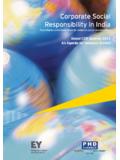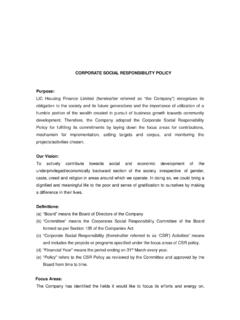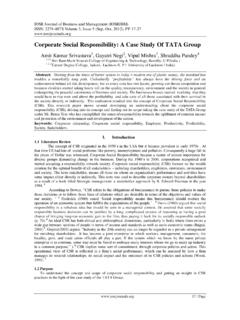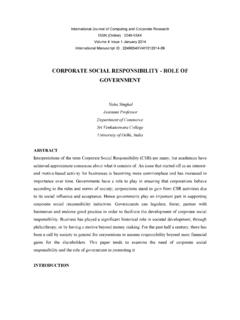Transcription of Corporate Social Responsibility (CSR) - ECRC
1 A Guide to Corporate Social Responsibility (CSR). Corporate Social Responsibility (CSR). Starting point Why do businesses exist? What is the purpose of a business, or, in the bigger picture, any economic system? The derivation of the word company? Two Latin words, cum and panis, which mean breaking bread How does this origin translate in today's business environment? What are or should be the goals of the modern corporation? Opinions differ and cover a wide spectrum: Few trends could so I think many people assume, wrongly, that a company exists thoroughly undermine the simply to make money. While this is an important result of a very foundations of our free company's existence, we have to go deeper and find the real society as the acceptance by reasons for our being. As we investigate this, we inevitably Corporate officials of a Social come to the conclusion that a group of people get together Responsibility other than to and exist as an institution that we call a company so that they make as much money for are able to accomplish something collectively that they could their stockholders as not accomplish separately they make a contribution to possible.
2 Society, a phrase which sounds trite but is fundamental. Dave Packard3. Milton Friedman, 19622 Co-founder of Hewlett Packard Company in 1939. Corporate Social Responsibility (CSR) represents an attempt to address these questions. What is CSR? The entirety of CSR can be discerned from the three words contained within its title phrase: Corporate ,' Social ,' and Responsibility .' Therefore, in broad terms, CSR covers the responsibilities corporations (or other for-profit organizations) have to the societies within which they are based and operate. More specifically, CSR involves a business identifying its stakeholder groups and incorporating their needs and values within the strategic and day-to-day decision-making process. 1. Michael Arndt, An Ode to The Money-Spinner,'' BusinessWeek, March 24, 2003, pp22-23; review of The Company: A Short History of a Revolutionary Idea,' by John Micklethwait & Adrian Wooldridge, Modern Library, 2003. 2. Milton Friedman, Capitalism and Freedom, Chicago: University of Chicago Press, 1962.
3 3. Charles Handy, What's a Business For?' Harvard Business Review, December 2002, p54. 1. A Guide to Corporate Social Responsibility (CSR). Therefore, a business' society' within which it operates, which defines the number of stakeholders to which the organization has a Responsibility ,' may be broad or narrow depending on the industry in which the firm operates and its perspective. Other definitions of CSR: The notion of companies looking beyond profits to their role in society is generally termed Corporate Social Responsibility (CSR) .It refers to a company linking itself with ethical values, transparency, employee relations, compliance with legal requirements and overall respect for the communities in which they operate. It goes beyond the occasional community service action, however, as CSR is a Corporate philosophy that drives strategic decision-making, partner selection, hiring practices and, ultimately, brand South China Morning Post, 2002. The Social Responsibility of business encompasses the economic, legal, ethical, and discretionary expectations that society has of organizations at a given point in Archie B.
4 Carroll, 1979. CSR is about businesses and other organizations going beyond the legal obligations to manage the impact they have on the environment and society. In particular, this could include how organizations interact with their employees, suppliers, customers and the communities in which they operate, as well as the extent they attempt to protect the The Institute of Directors, UK, 2002. CSR is a means of analyzing the inter-dependent relationships that exist between businesses and economic systems, and the communities within which they are based. CSR is a means of discussing the extent of any obligations a business has to its immediate society; a way of proposing policy ideas on how those obligations can be met; as well as a tool by which the benefits to a business for meeting those obligations can be identified. What business areas does CSR cover? CSR covers all aspects of an organization's operations and can be divided into the subsections identified in Figure 1.
5 Example issues from these subsections are given in more detail in the Example Issues' section: 4. Michael McComb, Profit to be found in companies that care,' South China Morning Post, April 14, 2002, p. 5. 5. Archie B. Carroll, A Three-Dimensional Conceptual Model of Corporate Performance,' Academy of Management Review, 1979, Vol. 4, No. 4, p. 500. 6. Ruth Lea, Corporate Social Responsibility : IoD Member Opinion Survey,' The Institute of Directors, UK, November, 2002, p10. 2. A Guide to Corporate Social Responsibility (CSR). Figure 1: What is CSR? Why relevant today? Increasing affluence Growing Social expectations Vital element of Corporate Globalization/free flow of information strategy in a global environment. Result = empowered stakeholders. Day-to-day operations: environmental sustainability workplace issues Corporate governance Cynicism transparency Social audits Ethics Personal and legal Strategic obligations, as opposed to discretionary actions.
6 SRI philanthropy Corporate Community engagement activism Diversity Community Relations Moral Stakeholder relations: righteousness Legislation & 9 Internal (employees, suppliers, distributors). litigation 9 External (investors, NGOs, government, media, consumers). Strategic brand management Cultural conflict Brand building Profit Brand insurance'. Crisis management Patriotism External PR/ad.: o Meet consumer expectations o Cause-related marketing 3. A Guide to Corporate Social Responsibility (CSR). CSR vocabulary CSR is also referred to as: Corporate ' or business Responsibility '. Corporate ' or business citizenship'. community relations'. Social Responsibility .'. Closely related concepts that are all contained with the total CSR perspective are: Social and environmental auditing stakeholder theory business ethics environmental sustainability strategic philanthropy (cause-related marketing). Corporate governance Consistent definitions, labels and vocabulary have yet to be solidly established in the field.
7 What CSR is not It is important to stress that the study of CSR focuses largely on the margins of a business'. discretionary actions and obligations. This is rather than any legal or regulatory obligations individuals and corporations face in the day-to-day management of operations within any specific industry. To break these rules and regulations is to break the law. Such infractions are simply actions that are illegal. Of course, adhering to the law is an important component of an ethical organization's ethos, but it is not the primary concern of CSR, which primarily deals with decisions incorporating discretionary actions. CSR is a business strategy and, therefore, represents actions that need to be positively selected, or avoided. CSR advocates believe there is strategic advantage to a company that makes these choices. It is also important that CSR focuses on areas of immediate relevance to an organization's sphere of operations. CSR is not about pursuing the CEO's pet interest and saving the whales.
8 ' CSR. should be distinguished from concepts such as strategic philosophy' and cause-related marketing,' which are valid business strategies and form an element of an organization's CSR. policy, but are not a central component of CSR. CSR is a much more holistic approach to business, which is designed to enhance Corporate success because of its relevance, rather than represent something unconnected to an organization's core business. The origins of CSR. CSR as an issue has been around since commerce began: 4. A Guide to Corporate Social Responsibility (CSR). The history of CSR is almost as long as that of companies. Concerns about the excesses of the East india Company were commonly expressed in the seventeenth century. There has been a tradition of benevolent capitalism in the UK for over 150 years. Quakers, such as Barclays and Cadbury, as well as socialists, such as Engels and Morris, experimented with socially responsible and values-based forms of business.
9 And Victorian philanthropy could be said to be responsible for considerable portions of the urban landscape of older town centres In terms of activism aimed at companies perceived as acting against the general interest: The first large-scale consumer boycott? England in the 1790s over slave-harvested sugar. (It succeeded in forcing the importer to switch to free-labor sources.) .In 1612, English jurist Edward Coke complained that corporations cannot commit treason, nor be outlawed or excommunicated, for they have no souls. 8. Arguments underpinning CSR. Arguments offered in favor of CSR can be broadly split into two camps moral and economic. 1. A moral argument for CSR. While recognizing that profits are necessary for any business entity to exist, all groups in society should strive to add value and make life better. Businesses rely on the society within which they operate and could not exist or prosper in isolation. They need the infrastructure that society provides, its source of employees, not to mention its consumer base.
10 CSR is recognition of that inter-dependence and a means of delivering on that obligation, to the mutual benefit of businesses and the societies within which they are based: CSR broadly represents the relationship between a company and the wider community within which the company operates. It is recognition on the part of the business that for profit' entities do not exist in a vacuum, and that a large part of any success they enjoy is as much due to the context in which they operate as factors internal to the company alone. Charles Handy makes a convincing and logical argument for the purpose of a business laying beyond the goals of maximizing profit and satisfying shareholders above all other stakeholders in an organization: 7. Adrian Henriques, Ten things you always wanted to know about CSR (but were afraid to ask); Part One: A brief history of Corporate Social Responsibility (CSR),' Ethical Corporation Magazine, May 26, 2003, 8. Michael Arndt, An Ode to The Money-Spinner,'' BusinessWeek, March 24, 2003, pp22-23; review of The Company: A Short History of a Revolutionary Idea,' by John Micklethwait & Adrian Wooldridge, Modern Library, 2003.








